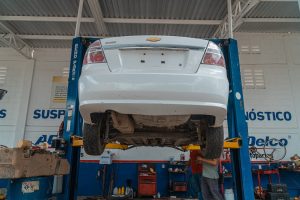- Order Your New Chevrolet Right Now!
- Click Here Now!
 Your catalytic converter works under conditions of great heat and pressure. These factors, together with age, will take their toll on the converter. As your local Chevy dealer, we’d like you to know some signs we need to repair or replace your converter.
Your catalytic converter works under conditions of great heat and pressure. These factors, together with age, will take their toll on the converter. As your local Chevy dealer, we’d like you to know some signs we need to repair or replace your converter.
Your Engine Dies After It Starts
One of the signs of a failed converter is your engine fails within seconds of starting. This problem can sometimes be mistaken for an electrical issue. The cause of the problem is a blocked converter. The converter changes dangerous chemicals into less harmful ones. One of the byproducts of your engine and this process is carbon. Carbon can slowly build up, solidify, and block the exit of the converter.
When your engine starts, the combustion process begins. The combustion residue is dumped into the converter, and combustion continues. If the converter is blocked, the converted gases are forced into your engine. The arrival of these gases creates back pressure in your engine, which shuts down in response. Our technicians can remove the blockage to fix this problem.
Your Converter Looks Blue
If you slide underneath your car, you’ll see the bulbous converter attached to the exhaust system. The converter usually also stands out as it looks shinier than the rest of the system. If you see a blue tinge on the converter, it’s a sign the converter is failing. This failure is caused by excessive heat inside the converter, which causes it to burn out.
Excessive heat can be caused by several factors, including a failed oxygen sensor or a fuel-rich engine. A fuel-rich engine has a higher percentage of fuel than air. This situation can result in poor combustion, where much of the fuel in the cylinders doesn’t burn. This hot fuel is ejected into the converter and raises its internal temperature. We can’t fix a burnt converter, but we can replace it to fix the problem.
Your Converter Is Rattling
Rattling noises from the converter could be a sign that one of the brackets securing the converter to the underside of your car has loosened. These noises could also mean that the interior of the converter is crumbling. The inside of a converter resembles a honeycomb and provides a large area for the efficient conversion of toxic gases.
Your converter can be damaged in various ways, including the above example. Hot fuel residue can crack some of the honeycomb structure. These cracks will expand, and pieces will break off. This weakens the honeycomb and contributes to further damage. We can’t repair the damage to the honeycomb, but we can fit a new converter.
If your converter is failing, call us right away at Ed Martin Chevrolet.
Image courtesy of Midia via Pexels





